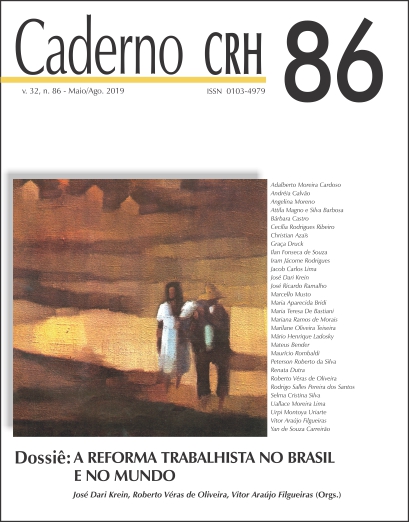REFORMA TRABALHISTA: precarização do trabalho e os desafios para o sindicalismo
DOI:
https://doi.org/10.9771/ccrh.v32i86.30691Palavras-chave:
Sindicalismo, Reforma trabalhista, Precariedade, Negociações coletivasResumo
O artigo se propõe a identificar os impactos iniciais da reforma trabalhista sobre o sindicalismo em um contexto desfavorável aos trabalhadores e à ação coletiva, dado o crescimento da precariedade e da informalidade no mercado de trabalho. A análise trata da reconfiguração das classes trabalhadoras e da fragmentação sindical, bem como dos impactos da reforma sobre as estratégias e ações sindicais e sobre as negociações coletivas. A metodologia combinou pesquisas quantitativas sobre mercado de trabalho com análise documental (instrumentos normativos, matérias de imprensa comercial e sindical) e observação participante. Os resultados mostram que os sindicatos buscam se adaptar ao novo contexto, com pequenas inovações substantivas na ação e organização, e que as negociações têm sido tanto espaço de resistência quanto de legitimação do conteúdo da reforma.
LABOR REFORM: precarious work and the challenges for unions
The paper proposes to identify the initial impacts of the labor reform on trade unionism, in a context that is unfavorable to workers and to collective action, resulting from the transformations in the reconfiguration of the working classes, with the growth of precariousness and crisis of the labor market. The analysis focuses on the impacts of this reconfiguration of the working classes and the fragmentation of trade unions, as well as the impacts of the labor reform on union strategies and actions and on collective negotiation. The methodology combined quantitative labor market research with documents (collectives work contracts, commercial and trade union press materials) and participant observation. The results show that the trade unions are searching to adapt to the new context with some substantive innovations in action and organization. The latest negotiations have been, at the same time, spaces of resistance and legitimization of the content of the reform.
Key words: Trade unionism; Labor reform; Precariousness; And collective bargaining
RÉFORME DU TRAVAIL: le travail précaire et les défis du syndicalisme
L’article propose d’identifier les impacts initiaux de la réforme du travail sur le syndicalisme, dans un contexte défavorable aux travailleurs et à l’action collective, en raison du développement de la précarité et de l’informalité dans le marché du travail. L’analyse porte sur la reconfiguration de la classe ouvrière et de la fragmentation syndicale, aussi bien que sur les impacts de la réforme sur les stratégies et actions des syndicats et sur la négociation collective. La méthodologie combine une étude quantitative du marché du travail avec des documents (contrats de travail collectives, matériel de presse commerciale et syndicale) et de l’observation participante. Les résultats montrent que les syndicats essayent de s’adapter au nouveau contexte, avec de petites innovations substantielles dans l’action et l’organisation, et que les négociations sont autant des espaces de résistance comme de légitimation du contenu de la réforme.
Key words: Syndicalisme; Réforme du travail; Précarité; Négociation collective
Downloads
Downloads
Publicado
Como Citar
Edição
Seção
Licença
Todo o conteúdo da revista, exceto onde indicado de outra forma, é licenciado sob uma atribuição do tipo Creative Commons BY.
O periódico Caderno CRH on-line é aberto e gratuito.





